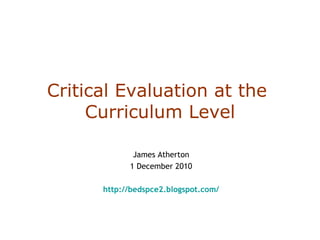
Curriculum evaluation noted_25
- 1. Critical Evaluation at the Curriculum Level James Atherton 1 December 2010 http://bedspce2.blogspot.com/
- 3. Gibbs’ cycle Just a reminder of the components of an evaluation and development cycle, after Graham Gibbs Description What happened? Conclusion What else could you have done? Action Plan If it arose again, what would you do? Feelings What were you thinking and feeling? Evaluation What was good and bad about the experience? Analysis What sense can you make of the situation?
- 5. Brookfield’s four “lenses” There’s nothing exclusive about choosing these particular lenses or perspectives. It is their multiplicity which is important. Brookfield S D (1995) Becoming a Critically Reflective Teacher San Francisco; Jossey-Bass
- 9. This is the formal curriculum
- 10. This is the formal curriculum This is broadly where it works; you set out to teach something , and the students learn it
- 11. This is the formal curriculum This is broadly where it works; you set out to teach something , and the students learn it This is what you teach but the students do not learn; it’s a waste of time
- 12. This is the formal curriculum This is broadly where it works; you set out to teach something , and the students learn it This is what you teach but the students do not learn; it’s a waste of time And this is the hidden curriculum ; stuff you did not set out to teach, but the students learned anyway.
- 15. Formal/intentional message Covert/unintended message “ Good” : covert message reinforces formal message
- 16. “ Bad” : covert message contradicts/undermines formal message Irrelevant/neutral
- 20. This is Etienne Wenger’s take on a community of practice. Much of it is not formally designed as an organisation; it develops organically... Based on Wenger E (1998) Communities of Practice Cambridge; CUP p. 63 Participation Reification meaning world experience negotiation living in the world membership acting interacting mutuality forms points of focus documents monuments instruments projection
- 21. ...out of the interaction of participants, and the way in which procedures take on a life of their own and may even take physical form (reification) Based on Wenger E (1998) Communities of Practice Cambridge; CUP p. 63 Participation Reification meaning world experience negotiation living in the world membership acting interacting mutuality forms points of focus documents monuments instruments projection